#My love for meta posts
Explore tagged Tumblr posts
Text
Clive. 💙🕊️
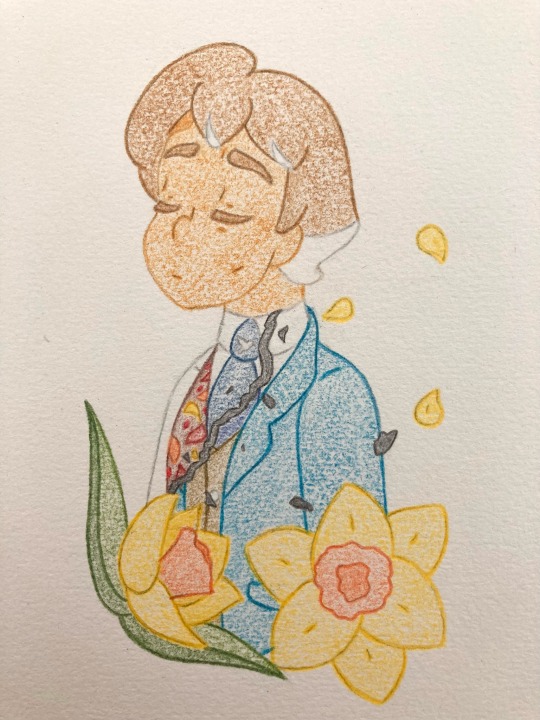


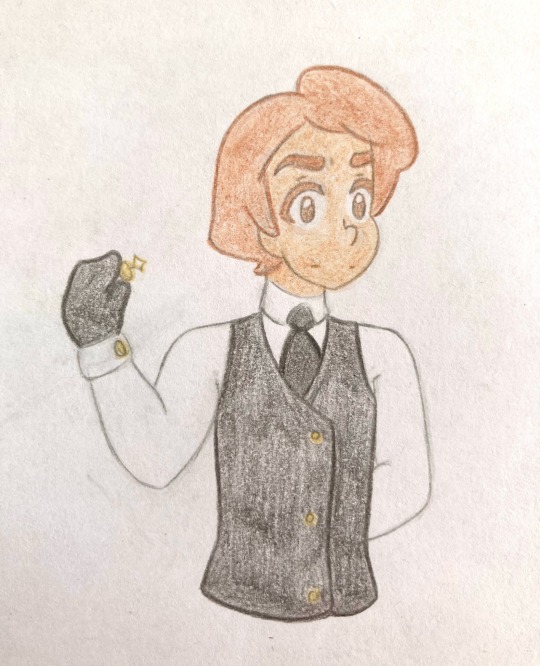
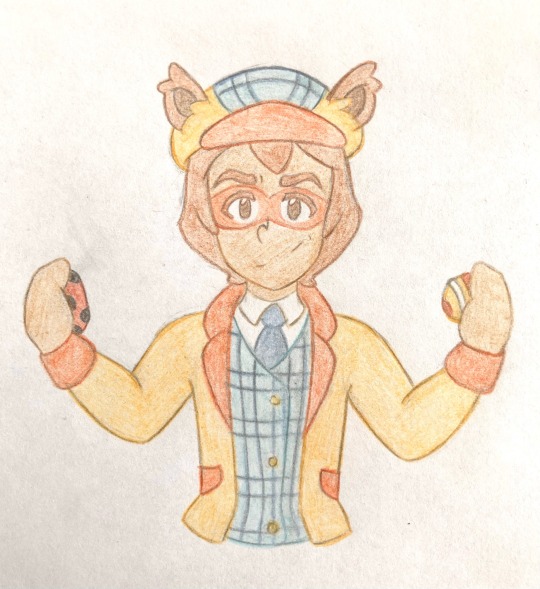

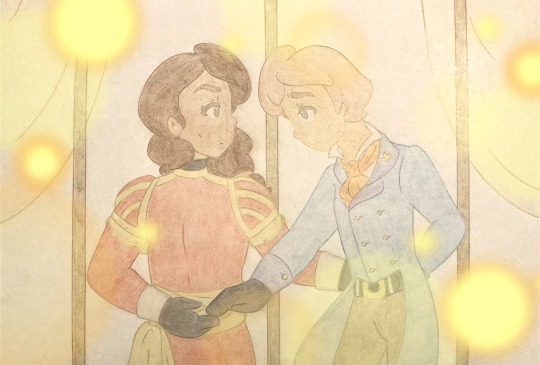
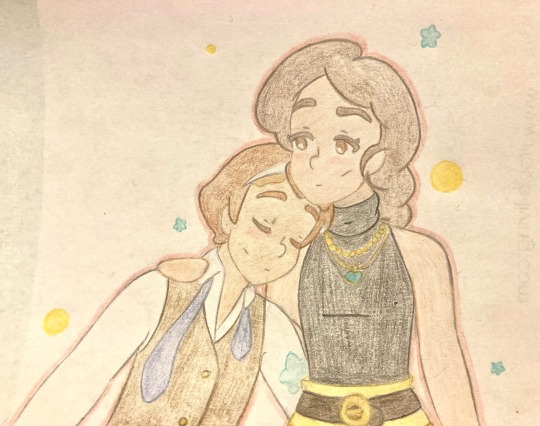
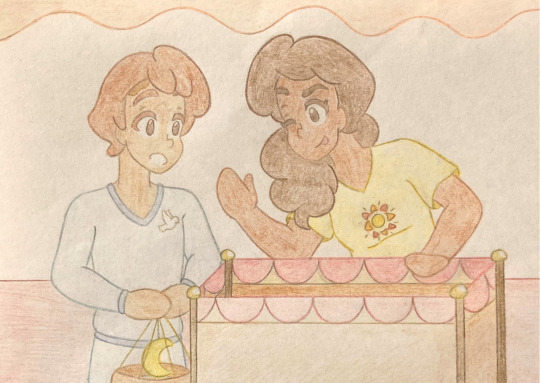

That’s it. That’s the post.
#I’ve been working on so many Miraculous things and my creative drive has never been better#But I want you guys to know that this is all because of HIM#My writing and drawing skills#My love for meta posts#Even MY UNDERSTANDING OF ENGLISH#All of these were developed because of one (1) fictional character#OH YEAH HE ALSO GOT ME AN ENTIRE BEST FRIEND 💛#Man of my life 💙🕊️#(It’s funny because I’m a lesbian)#professor layton#clive dove#emmy altava#clemmy#nina draws
23 notes
·
View notes
Text
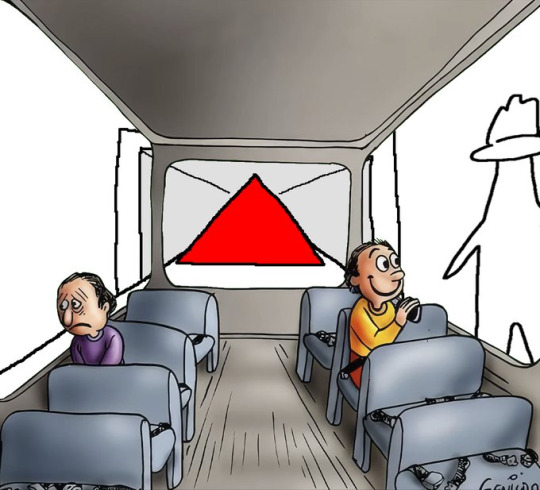
Two Guys at the Triangle Factory by ammnontet
4K notes
·
View notes
Text
I will never get over binghe and that damn congee. a meal he didn't manage to bring to his mother on time before she died. a meal he remade every couple of hours over the course of several days when sqq was unconscious from without-a-cure so that when he woke, he'd have something fresh to eat. the meal that he made every day for five years, in the hope that sqq's corpse would someday wake up and eat it
what's really striking to me is that first time he makes it for sqq. this is right after sqq took a major hit for him, getting struck with a poison that should've killed him, all for binghe's sake. I imagine poor binghe must have felt pretty helpless after that. it's not like he could help with sqq's medical recovery or tend to his qi or rouse him from his brief coma, but he needed to do something to show his gratitude for what sqq had done for him, and it makes me emotional that the decision he comes to is "when shizun wakes, he'll be hungry, so I should feed him" and then he proceeds to make the same congee over and over every couple hours until sqq wakes up
#svsss#FOOD AS LOVE!!!!#a trope that gets me EVERY TIME!!!!#svsss reread#i take one (1) melatonin and the delirious binghe posts start happening#my meta
2K notes
·
View notes
Text

God this panel kinda drives me crazy. From Batman & the Outsiders #17, Shiva asks Duke about his suit, whether it was his choice. And how does Duke respond? He... doesn't. He parrots what is clearly something Bruce said to him, but never clarifies whether it was 'his choice' at all. Because both him and Shiva know it wasn't. And he acknowledges that his suit, with all the Batty-ness (ears, symbol), was specifically designed to make him like Batman.

Then Shiva suggests dark red, which is what Duke wore in We Are Robin and has connotations to Robin as a whole. Duke's reaction - can we let it go? - can be read in many ways, but to me it suggests Shiva's words hit home. He does miss the Robin colours. Becoming the Signal wasn't his choice, but becoming Robin was.
(And throughout this run, Shiva says both Cass and Duke are being held back by Bruce. With Cass this is a clear allusion to being Orphan over Batgirl, so it's not farfetched to read this conversation as being about how Duke was denied Robin to become Signal).
Duke-as-Signal is a symbol of 'people like Batman', but Duke-as-Robin was a symbol of youth, of community, of diversity and of choice. He was a Robin formed without Batman. I know there's no going back, but having Bruce choose the name, the suit, and the time of day that Duke goes out makes the Signal such a fraught identity. I love the yellow, the suit, and the daytime aspect, but I just wish they were Duke's choices, not Bruce's.
#duke thomas#lady shiva#batman#speaking of which lady shiva is always here to put bruce in his place i love it <3#in batman & the outsiders she gives choices to all the poc kids - duke cass and sofia#it's actually vitally important that freedom and choice for these characters of colour is represented by a woc and not bruce#this is not saying bruce is to blame for the signal. he just lacks the perspective to understand what duke needs#like no bruce it was not progressive of you to be like 'this one's different'#um anyway sorry this is my hundredth 'duke should be robin' post i just have feelings about it#meta
2K notes
·
View notes
Text
I watched "Measure of a Man" not long ago, and while it was indeed very good, the weird, toxic, bitter relationship between Picard and his JAG ex really made me nostalgic for one of my favorite Kirk/lady of the week relationships—Kirk and Areel Shaw in "Court Martial."
Kirk himself is the one on trial in "Court Martial," and Areel is the prosecuting attorney rather than the judge. They're exes in their early 30s who broke up in the past for unknown reasons, but are still fond of each other, respectful, and retain an amicable, pleasant relationship years after their break-up. Both of them handle the strain of Areel's professional obligations with maturity and grace, but not impossibly idealized invulnerability. Areel recommends a good defense lawyer for Kirk and regrets the role the situation places them in, but she also doesn't sabotage her case against him and is good at what she does.
The thing that really makes this a favorite "Kirkmance" for me, beyond all this, is that it's very obvious that both of them still care a lot about each other and remain deeply attracted to each other. Neither of them have anything to gain by this. They're both too intelligent and sensible to consider re-kindling their old romance; it fell apart for a reason, despite the lingering affection/attraction, and for pragmatic reasons, sex isn't on the table.
But both early and late in the episode, Kirk and Areel seem to enjoy the flirtation for what it is: not calculated or desperate, not useful, not some fridge horror dub-con scenario, not a high-romance disaster waiting to happen, not even a prelude to a one-night stand, just a fun and affectionate acknowledgment that the chemistry remains strong and they still love each other in a way. There's something genuine and tender and unforced about their flirtation and mutually agreed-upon good-bye kiss that is just so conspicuously different from the tactical Kirkmances. I think it's really lovely, actually:




#anghraine babbles#long post#areel shaw#james t kirk#anghraine's pics#star trek: the original series#star peace#tos: s1#tos: court martial#tng critical#c: who do i have to be#anghraine's meta#kirk x areel#sort of! i don't want them to get back together but i love them as smart amicable exes who are still attracted and affectionate#it's wild to me that people will go on about how he's obviously super into lenore or shahna or deela (?????????????????)#and nothing about my girl areel where there's no dub-con or seduction or some other end - just pure liking and chemistry
517 notes
·
View notes
Text

happy 4th anniversary heart and soul!
#meta knight#galacta knight#kirby right back at ya#post's art gallery#it's that time again#my beloved rivals to idiots. juggling them like bowling pins#bit of a writing update for those listening in! as it stands the last few chapters are still outlined but not finished#but they're not forgotten#I go in and check on them from time to time#I'll be coming back around to IYD eventually. just gotta run off with other passions to keep the mind fresh#better to let it cool off as long as it needs in the interim!#huge big thank you to everyone who's loved and supported this series over the years! It continues to hold a special place in my heart#which is why I'm giving it the supreme vacation treatment#when will the orbs return? who knows. but they'll be ballin when they do#thanks for tuning in folks!#eat a strawberry today. for galacta. delcious
445 notes
·
View notes
Text
I find the fact that the confrontation at the end of UTRH is often summarized as Jason asking Bruce to kill the Joker for him fascinating.
Because that's not what happened.
Jason holds a gun up to Joker's head, gives Bruce another, and tells him that if Bruce doesn't do something (shoot Jason), he will kill Joker.
Jason doesn't give the gun to Bruce so that he would shoot Joker. He isn't expecting Bruce to pull the trigger on the clown. He's asking Bruce to do nothing. To be inactive. Because that will still be a choice, and despite having done nothing, everybody clearly agrees that Bruce would still, at least in part, be responsible for Joker's death.
...And to me, this moment is a kind of- microcosm, of the rest of Jason's point. Because after being captured and carted off to Arkham, the villain will escape again, and will kill more people. The only way to truly prevent that from happening would be to kill them; Bruce refuses to do so, and I respect his right to choose such a thing for himself, but it is still a choice, and if we agree that Bruce's inaction during the confrontation would leave him at least partly responsible for the Joker's death, then we must also agree that his inaction in permanently preventing the Rogues from killing more people means he is also, partly, responsible for all of those deaths.
#my dc posting#batman#dc#bruce wayne#jason todd#joker#uhh is this like analysis or meta#anyway. to me this is the message that scene sends#if we say bruce doing nothing would mean he assisted in the murder of joker then bruce doing nothing about the villains means he is also#responsible for those deaths#ANYWAY yes b4 you come at me;;#bruce's belief in rehabilitation and that everyone can get better is central to his character#and i love it and no i dont actually think he should kill the rogues or whatever#but the question there is. Are you fine with the future victims your decisions will cause?#Are their lives worth the slim chance any of these people will get better?#batman says yes theyre worth it. red hood says no theyre not.#thats the fundamental moral difference there#its why jason challenges the batman status quo#which is why he cant be harnessed well after his initial return bc comics can never truly escape that status quo#anyway i sure am having some thoughts for someone not that smart so if you disagree please tell me!!! just be civil or ill just block you <#...anyway this is another thing BTAS succeeds in bc i always feel like yes these villains do deserve yet another chance#despite what theyve done. bruce's belief in them doesnt feel stupid and naive#its abt what you yourself can live with. bruce can live w the deaths of the ppl the criminals he doesnt get rid of kill#and jason can live with killing those criminals and preventing further victims
1K notes
·
View notes
Text
Chuuya's reaction to Dazai getting hurt during the Lovecraft fight has always been so interesting to me...
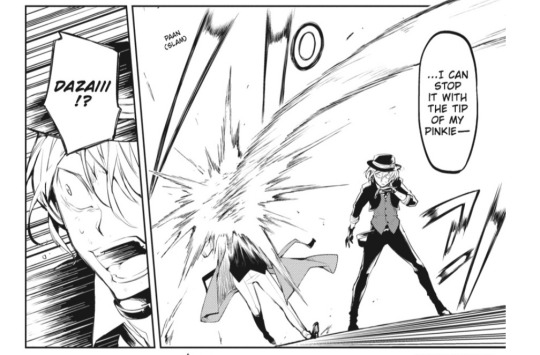
Because it's the kind of worry you'd never expect from a character as gruff as Chuuya, who had displayed nothing but hostility towards Dazai so far. Usually, characters that are labelled as "angry" or "anger issues" (which Chuuya is much more complex than that but you get my point) act more as a tsundere type of way when the one they "don't care about" gets hurt. And show their care in very, very subtle ways (ex. their eyes widen, their mouth parts and closes again, etc) before putting up their front once more.
Chuuya, however, is open, and vocal about it. His worry is clear not only to us, but to Dazai himself, the one he shouldn't be displaying the concern to (as per the cliche). Shouldn't it be some sort of secret that Chuuya does care? Isn't that what skk's dynamic has been shaping up to be until now?
I'm telling you- the way my mind blanked when Chuuya just casually.... showed concern not once, but twice, was a sight to see.
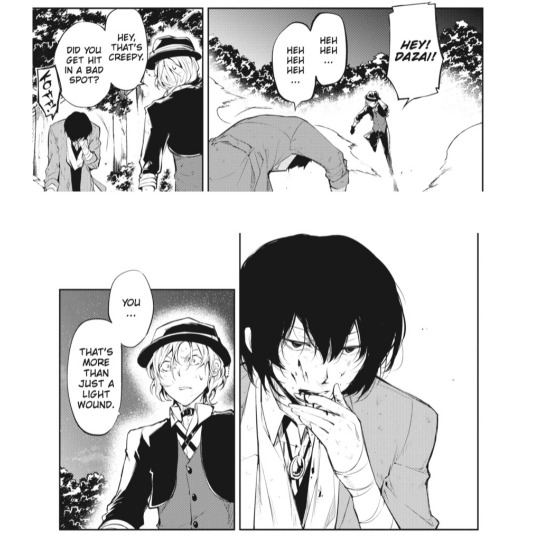
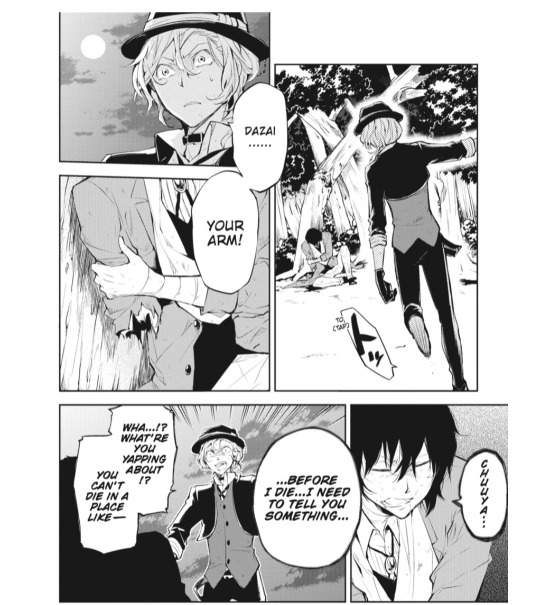
Besides, the context makes it much more confusing, because Dazai isn't some rookie, and Chuuya knows that more than anybody. He was the youngest executive in Port Mafia's history, of course he can handle a hit or two. Of course he'd seen him handle a hit or two, sometimes without batting an eye.
Heck, Chuuya himself was hurling Dazai like a ragdoll in their reunion, which was their last meeting. And you could argue that he was going easy on him, but Dazai has mostly withstood the same damage (as far as I could see), and Chuuya was as bitter as ever.


So that kind of contradicts both what we knew of Chuuya so far, and how their dynamic was shaped to be. I mean, that just makes Chuuya a hypocrite, yeah? What makes him care now, all of a sudden? What makes him care at all?
Well, to me, this backasswards reaction implies one (or more) of the following:
- Dazai rarely got physically hurt during their partnership and thus this is an unexpected thing for him to see (during a mission).
- The four years of separation made Chuuya unsure of how much Dazai can withstand physically now. Also the fact that he isn't in the mafia anymore, aka fighting enemy organizations on the weekly, would naturally make Dazai lose his touch in a way, what prompts Chuuya's reaction.
- Dazai getting taken off guard took him off guard which led to panic. Especially since the situation was (momentarily) out of their depth. Seriously wtf even was Lovecraft?
- During the dungeon scene Dazai was an enemy, while in the Lovecraft fight he was as an ally. The difference might be significant to Chuuya.
- This has always been Chuuya's reaction to Dazai getting hurt regardless of the situation.
- "Only I can hurt him like that" ahh logic
- Asagiri was still experimenting with their dynamic and thus there are some inconsistencies.
This scenario didn't play out again (after their reunion) for me to exactly determine which one is more plausible, but it is 100% canon for Chuuya to shamelessly show his concern and run to Dazai to check on him before properly dealing with their opponent, which I find to be such an appealing layer to their dynamic, and a good spin on the type of character he gets stereotyped as.
Bonus: Dazai also becomes a softy when Chuuya's hurt, especially post corruption. Dead Apple alone displays that multiple times.
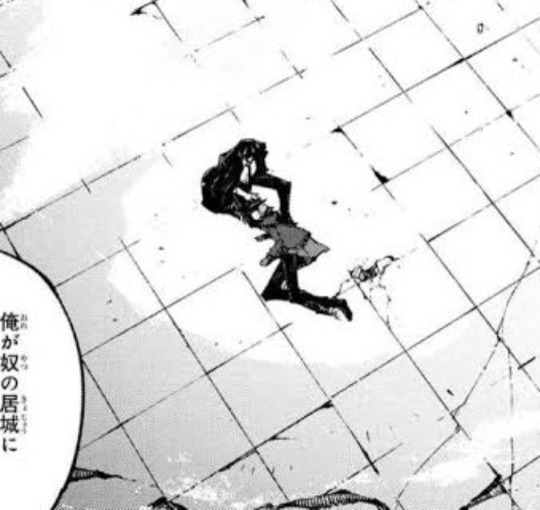
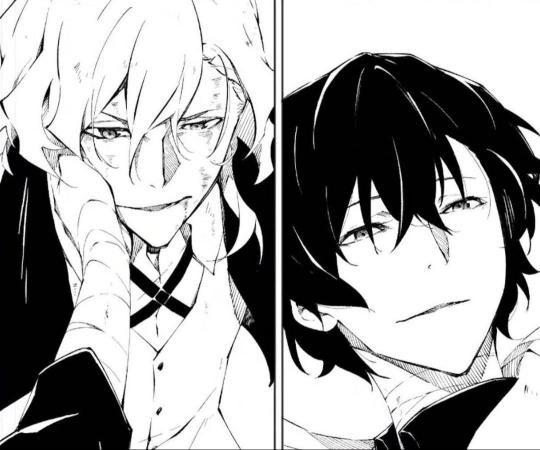
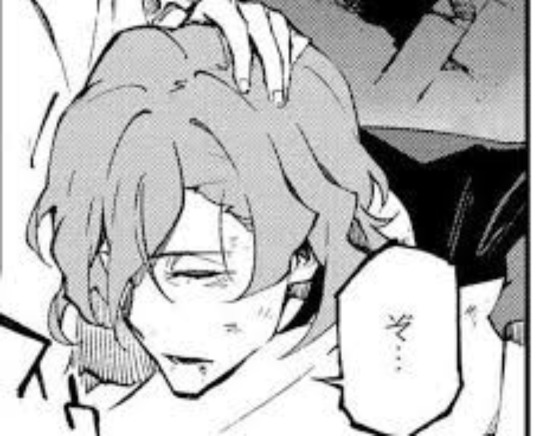
All in all, Skk are doing a terrible job at maintaining their 'hostile' and 'antagonistic' relationship post their reunion. Freaks.
#I was too lazy to scour throgh SB and 15 and find Chuuya getting worried again which might prove the last points#tho I think they're the most unlikely#I love them displaying these sort of things openly#for Chuuya it's just natural to be concerned#it's natural to say 'because I trusted you'#and while Dazai isn't as expressive with his care#he never cowers away from calling Chuuya 'partner' after 4 years#or express that how he saved him was 'beautiful'#these things come so easily for them you wonder why they're even labelled as rivals at all#you *can't* give a clear label on their relationship#friends? they hate each other. Rivals? they care about each other. Partners? they haven't been for 4 years.#each one you put on gets contradicted at one point#and that's the beauty and fun of it#thanks for coming to my TED talk#bsd#bungou stray dogs#chuuya nakahara#dazai osamu#bsd chuuya#bsd dazai#skk#soukoku#bsd analysis#bsd headcanon#bsd headcanons#skk analysis#bsd meta#J's post#J's writing ✍🏽
1K notes
·
View notes
Text
It really is SO funny (and meaningful, actually, if you think about it) to me that Stanley was the only member of the Pines family who was never able to be manipulated by Bill.
Stan's paranoia and distrusting attitude served him in the best way possible. Yeah, it sucks that he was basically cut off from forming lasting positive relationships up until he moved into Ford's shack in Gravity Falls, but MAN, that was kind of a small price to pay when you realize he unknowingly kept himself protected from one of the most dangerous entities in all of space-time by having that mindset and keeping his walls up all those years.
Can you imagine how fucking disastrous things could've turned out if Bill had gotten to him? Successfully infiltrated Stan's dreams, utilized his connection to Ford to his devious advantage as a bargaining chip, and used Stan for all he's worth to orchestrate Weirdmageddon his way? Ford spent 30 years hiding from Bill, constructing the quantum destabilizer, and putting all his energy into taking him out - to prevent him from meddling in the lives of those he cares about and to protect the world from his evil.
But it turns out, all you really have to do to foil Bill is just... not be swayed by him in the first place. There was NO combination of words in the human vocabulary Bill could have said to get Stan on his side at any point in the story, and tbh that's fucking hilarious.
Get fucked little man, you got outsmarted by the '''lesser''' twin, and he didn't even have to put any effort into it at all.
(And as the icing on the cake, he wrecked your sorry ass too. Smashed you to smithereens in one second flat.)
Truly tho, I think Stan is Bill's match. His equal opposing force. The yin to his yang. Essentially, when put together, they cancel each other out, lmao.
And I just know Bill will be forever haunted by that old man. He can make all the pitiful attempts to reach out from the Theraprism all he wants, but even if he were to escape someday, somehow, there is no coming back from that level of pure humiliation. 🤣
#gravity falls#gravity falls meta#bill cipher#stanley pines#stan pines#grunkle stan#bill and stan#the book of bill#even tho i don't fully subscribe to the same coin theory#i totally get where it's coming from#and it really does have a lot of merit#cuz look: idk whether the writers of GF intended it or not but bill and stan really are SO similar#but the biggest difference between them is stan's love for his family is his strength#whereas bill's connections to ppl he has loved (see: his family and ford) inevitably became corrupted#bc he doesn't know how to love properly#so he's uncontrolled and toxic and destructive and it led to his downful#compare that to stan whose love and devotion to/for his loved ones motivated him and kept him grounded & focused#and allowed him to succeed#stan is success and bill is failure#two parts of a whole narrative#two valuable lessons#one is an inspirational and educational story abt love#the other is a cautionary tale#you feel me?#my posts
461 notes
·
View notes
Text
As an appreciator of angst I like the times when the WoL's friends and allies worry for them: there's no doubt that the WoL can fight most anything and win, but that doesn't stop their loved ones from being concerned for their mental and emotional health, and there's an interesting flavor to that sort of drama. The scene I really want to talk about now though isn't about the WoL's friends.
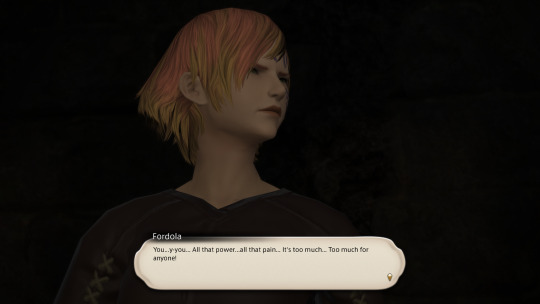
The scene being the one in the StB post-patches where Fordola has an Echo vision of the WoL's past and is, to put it simply, shaken by what she sees. Her horror at the WoL's past isn't because she's worried about them as a friend, far from it, she's basically still an enemy at this point. My brother has a good take that Fordola's false Echo acts as a sort of "forced empathy" for her - she has her ways of rationalizing and justifying the bad things she's done, feeling little for the people she hurts, until the Echo forces her to see and share in that pain. So she gets a moment of direct soul-to-soul communication with the WoL, not friend to friend but just human to human, and her reaction is shock, confusion, and a small amount of empathy too, because she felt their pain through the Echo.
No doubt it's a sobering moment for the WoL as well. Like her, like anyone else, they likely have their own ways of compartmentalizing, justifying, choosing the stories they tell themself about what they've done and what's been done to them. By Stormblood they've likely come to accept their way of life as what's normal for them - but then someone looks at their life and her reaction is basically "how have you not gone insane yet?". It's a jarring reminder that all that fighting and grieving and being used as a weapon is not normal or okay.
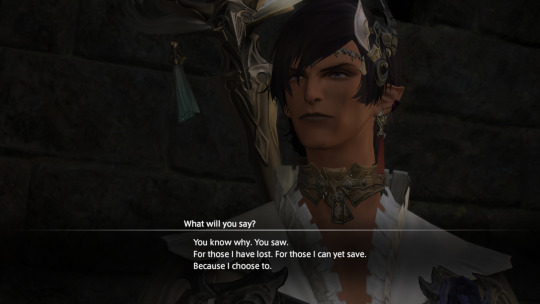
The dialogue options in response are all very characteristic of the WoL: simple and blunt, a little bit harsh - there's no quips here considering the gravity of the moment. There's also, notably, no "..." option that crops up often in other exchanges. You can't keep silence, in this moment you have to choose a reason to say why you're still standing, for your own sake as much as for the one asking.
(Also, I have heard that this exchange is a bit different in some of the other translations of the game, with more emphasis put on the Echo and how the WoL suffers from being exposed to other people's pain as opposed to just their own pain in the English version. I don't think either version is right or wrong, but I do like the rare times where the Echo is explored as something more than a plot device for giving plot-relevent flashbacks. The Echo is psychic empathy; the fact that they frequently get brain-blasted with other people's trauma plays a role in the WoL's heroism.)
#ff14#ffxiv#stormblood#warrior of light#wol#stormblood spoilers#meta posting on my art blog#guys I love the WoL#they're an absolute freak of nature and everyone can tell#it's not just because they're super strong too. they're near the boundary line of human in a psychological sense
486 notes
·
View notes
Text
chapter cards for thirteen: november - april
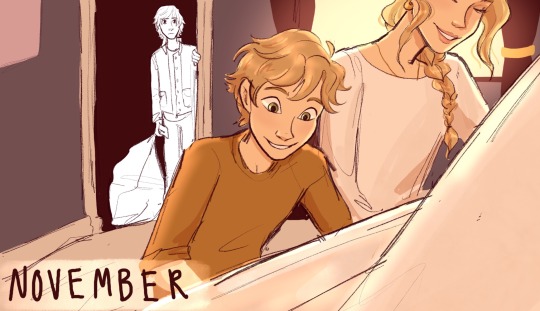
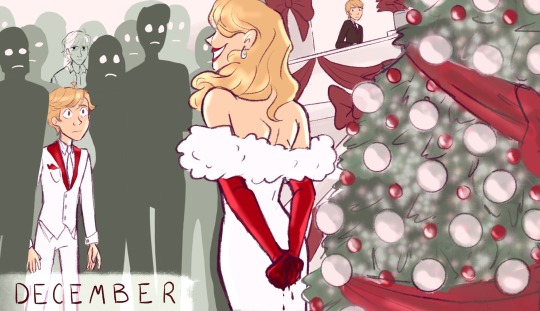
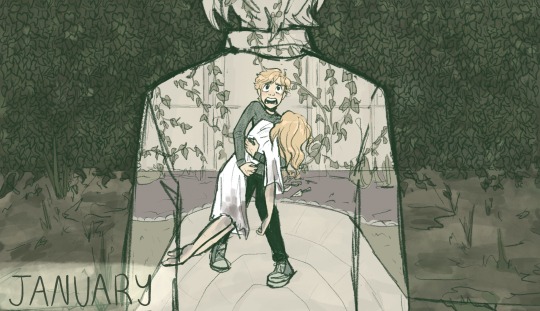
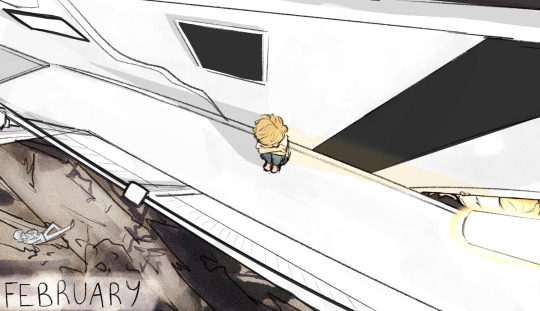
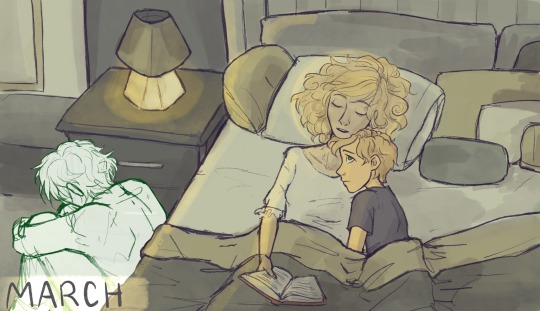
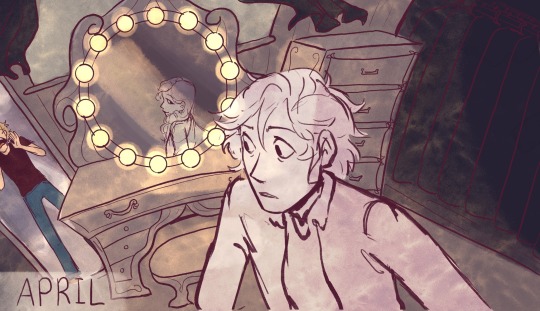
read on ao3
#I did want to post this bc it's been in my drafts for a while and I do like these#it's fun seeing them all together like this#like my metamorphosis covers master post that was so fun#it does feel a little bit like. I dont know.#meta or ironic or something#that I had to stick a hiatus right down the middle of the chapters#and right at the moment where [redacted] happened#it feels a little bit poetic for there to be a chasm there#watch me like get really inspired next week and write all of may and then none of this means anything lol#who knows#but anyway I like these#april in particular feels so fun and spooky#I love emilie agreste she scares me#autumn asukiess I know you now what im talking about#ml#miraculous ladybug#miraculous#my art#adrien agreste#emilie agreste#ml fic#thirteen
1K notes
·
View notes
Text
Characters who are a black hole. Characters who would see the infinite wastness of space and see themselves. Characters who are so immensely powerful, they could kill you without blinking. Characters who can't be defeated, no matter how hard you try. Characters who are angry, teeth gnashing, a swirling mass of a hungry void beneath their skin. Characters who are paradoxically, helplessly, vulnerable despite that. Who are kind. Who are gentle. Characters who will take that desperate endless void inside their heart and do their damnest to fill it with desperate endless love. Characters who, despite being a knife, have the softest edges of them all.
Yes, I am talking about Shigeo Kageyama.
#yeah im still thinking about mob. what about it#i just love that mob is both eldritch and human in equal measures. its one of my favorite goddamn things in this whole series its so good#mob psycho 100#mp100#kageyama shigeo#meta#my own post#edit: also feel free to tag your own characters to this!! no need to apologise!!
526 notes
·
View notes
Text
Thinking about Edwin telling Charles “you have to experience Hell to really see what’s here”.
Because… at what point has Charles officially “experienced Hell”? I think the consensus is that seeing the horror that was Edwin’s existence for so long was what allowed Charles to see the damned souls on his way out of Hell, but like… well, Edwin is technically a damned soul, too. So why could he see him immediately? Why could he see Edwin curled up and bleeding, see the Demon Spider Made of Babydoll Heads grab him and pull him down the hallways, see the pile of dead Edwins?
There are a couple different reasons I can think of off the top of my head. The first is that Edwin is only technically a damned soul— Charles can see him for the same reason he could see Maxine on the stairs. They’re both condemned to Hell, but not in the same way the souls in Limbo or Lust or Gluttony or, presumably, any of the other layers are. They’re not completely lost to it.
Another is that… well, it’s Edwin. It’s Charles and Edwin. He’s known him for decades— weird Hell rules aren’t going to make Edwin invisible to him (something something Charles saw Edwin as a ghost while he was still alive, even if only barely alive. Something something Charles has always been able to figuratively see Edwin, been able to understand him)
My last theory is that just seeing the Dollhouse in all its horrific glory, knowing it’s the end/beginning of Edwin’s map, and thus the place where Edwin was tortured for decades, could have easily been enough to count as experiencing Hell. On top of that, he’s looking at Edwin’s map of the Dollhouse. Kate Whyte Studio did an amazing job of creating the map for Edwin’s notebook, complete with little notes all over it— “not safe” “danger” “tired” “lost” “bad” “fuck” “no” “don’t go here” “trapped” “dead end” and the two that I think would fuck with Charles the most, “so lonely” and “no help”.
Yeah. I think that would do it.

Also edited image under the cut where I’ve circled the notes mentioned so you don’t have to go note hunting like I did
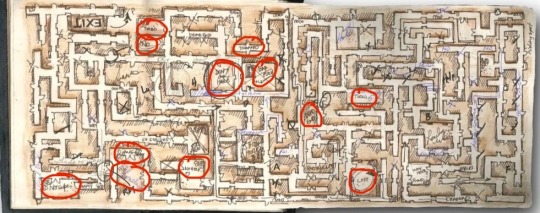
#also side note but I love the notes on the lower image ‘hate this door’ and ‘hate this gate’#Dead Boy Detectives#DBDA#Dead Boy Detective Agency#Charles Rowland#Edwin Payne#reference#(for myself lol)#my post#meta
310 notes
·
View notes
Text
The Narrator's perspective only gets more horrifying the longer you think about it. Like, imagine being an Echo of yourself—one of many, all made to serve a very particular purpose and knowingly living on borrowed time, if 'living' is even the right word for your current state of pseudo-existence.
You've inherited the mission of a dead man—it's literally the only thing left that you can do before fading, so you sure as hell better believe in it; the alternative would be unbearable. Only you keep failing. With every loop that you don't remember, your lack of agency in this situation becomes starker—you can influence small things, sure, but it becomes increasingly clear that you have no real power, no matter how personally invested you are in the events unfolding in front of you. You are, after all, only an Echo. You've forfeited the right to meaningfully engage with the world.
Worse—every loop you're made aware of is another time you've failed, with unimaginable consequences, though you had no control over these previous iterations of yourself and can't even learn from their mistakes. Everyone around you is operating on a shared perception of reality that you are not part of, will never be part of. After a few repetitions, you are, ironically, the least informed person in the room. All you have left to go on is an evidently outdated script. At the same time, everyone else is experiencing a contiguous version of you, comprised of parts that are, in some sense, also you, while at the same time existing at a complete remove from your current perception of self. Whatever you don't know you did—that's you now. You are, after all, only an Echo. You've forfeited the right to define your own identity, never mind know what it is.
Even worse—this has trapped you within a stagnant hell of your own creation. Nothing you say or do really matters in terms of your own self (the rest of the world is a separate issue entirely). Anything you've come to believe—say, for totally hypothetical example, that you were wrong actually and your envisioned paradise is really a hell beyond any you had the capacity to envision—has about as much permanence as a drawing in the sand. 'You' will continue, exactly as you were, no matter how much you might like to change your behavior. Every possible future has already been set in stone. You are, after all, only an Echo. You've forfeited the right to say anything you haven't already said.
For some reason, no part of any of this has made you feel more comfortable and at peace with the general concept of finality.
The really, truly absolute worst part, though?
There is no one for you to blame but yourself. And that's exactly what turns your story into such a tragedy.
#slay the princess#meta#my meta#slay the princess narrator#stp narrator#stp echo#for the love of god WHAT is his character tag this is a travesty#narrator sweep#natterings#stp posting#this was written as part of another much longer piece of enthusiastic narrator meta#like with screenshots and everything#but this was too good and self-contained NOT to post#in case of the very likely event where i dont finish the full thing#because unlike him i do recognize when im flirting with my own hubris#not that it ever stops me#anyway ask me about the narrator and why hes the most interesting character in stp#who is UNDERAPPRECIATED-- i mean uh#surprisingly overlooked#please there is so much that i could say
710 notes
·
View notes
Text
Ideology of Exceptionalism and Gravity Falls; meta and character analysis

I had a whole ago read a post by @icanlife that had a quote by Alex Hirsch on Ford's greatest flaw, and wanted to explore what the flaw is, which is the ideology of exceptionalism; in the exploration, I’ll touch on what it is and how it is used in abusive relationships and cults, as well as how it drives multiple Gravity Falls characters and consequently how it impacts relationships between these characters, and how the show ultimately refutes exceptionalism.
Quick note here; I am not in any way, shape or form a psychologist nor have any formal training in psychology; this is written from my own experiences with this ideology and my own forays into psychology and trauma-informed learning. It is also written with a loose understanding that is likely not broad enough to cover all references to cults, extremist groups and abusive relationships.
The Ideology of Exceptionalism
First of all, we have to get through a drier bit, which is… what is the ideology of exceptionalism and how does it arise? Might be fairly obvious, but it is the belief that you are, or belong to, a group of exceptional people, thus more important and worth more than anyone else; ie, those who don't qualify as 'exceptional'. It is often a subconsciously learned ideology. Now, what qualifies one as exceptional can be extremely varied; generally it revolves around something that provides some form of privilege. Thus, it might be, as the main exceptionalist idea in Gravity Falls, 'intelligence', or power, or it can be such things as attractiveness, quantity of money one has, species, nationality, or skin colour and ancestral heritage. The ideology of exceptionalism, being by nature hierarchical, devalues, and at its worst, openly and violently dehumanizes those who do not qualify as exceptional.
For why exceptionalism occurs is an extremely broad topic, but I've personally found that, for exceptionalism revolving around intelligence, it's a result of a poor sense of self-worth, and having one's self-worth tied to what makes one exceptional. Poor self-worth itself (again, broadly) is a result of childhood trauma from a lack of positive affirmation and unfulfillment of the emotional needs of the child. Meanwhile, self-worth becoming tied to the quality of exceptionalism generally is a result of when positive affirmation was pretty much solely provided around their 'exceptionalism', especially when provided derogatory commentary, or a blatant example of how they would be treated if they aren't 'exceptional'. As a result of the general lack of affirmation, self-worth then becomes often solely reliant on the qualities of exceptionalism, as that is the only way for the child (and later, adult) to get affirmation of their worth, as well as out of fear of being ‘not worth anything’ like the examples of ‘non-exceptional’ people they have been given.
This is especially likely to occur when the child is a social outcast; the adoption of the hierarchical ideology of exceptionalism, and the devaluation/dehumanization of others often occurs subconsciously as an avoidance/minimization tactic from pain. This is to say, the child, and later the adult (if healthy self-worth is not established) goes 'it doesn't matter what the non-exceptional people say or if they accept me since I matter more than them because of my exceptionality'. It can even be taken further, that being shunned is part of one's exceptionalism, and becomes part of the qualifier of being exceptional. For instance, 'they just can't understand because they aren't exceptional and that's just a part of being exceptional'. This idea also neatly tailors into the part of the concept of being better then others means you are separate from others; this can be taken that someone who is special, needs to be alone to be truly special.
Obviously, exceptionalism is not a healthy coping mechanism for poor self-worth, as often such people constantly feel the need to prove and show off their exceptionalism to gain that affirmation and avoid rejection, which is stressful. As well, it often negatively impacts their relationships with other people as a result of the arrogance of believing that they are better than most others, or even deliberate sabotage due to their arrogance. This occurs as they flatten the complexity of human experience to black-and-white hierarchical categories of exceptional/not-exceptional through constant judgement of those they meet, and often refuse to engage with people who don't belong to their 'exceptionality', or even people they simply don't like, even if they technically qualify. Generally, those that they do like or have close relationships with, often due to being similar, are automatically labelled as 'exceptional'. Those judged as ‘exceptional’ also become privy to the open judgements of ‘non-exceptional’ others, out of a subconscious belief by the exceptionalist that the other believes similarly; something that may strain their relationship if the other doesn’t ascribe to exceptionalism. This all culminates in the exceptionalist being blind or even adverse to the diversity of experiences, which makes it difficult to create relationships and community outside of echo chambers of their own beliefs (if they can even find this), and subsequently, these people are often isolated and have very few to no close relationships with people.
However, all humans require connections with other people, relationships where one can rely on others emotionally and physically if needed and feel accepted; they also require to feel like they are worth something, that their life has meaning. Lacking meaningful connections and having a crippled sense of self-worth, a deep yearning hole is left in these people. Exceptionalism, especially as it is a narrative constantly pushed by Western society as it validates hierarchies, is then employed as a (often subconscious) trauma response to assuage this yearning hole, with arrogance and denial. And depending on the circumstances, it can be a very strong and definitive trauma response for people.
This isolation and lack of self-worth is catnip to abusive relationships, including cults and extremist groups. These types of relationships often heavily rely on isolating their victims or pulling them into echo chambers of solely the abuser’s rhetoric, to redefine what is healthy through gaslighting; as the exceptionalists are already isolated, this makes them extremely susceptible. They also often provide these people affirmation, and in these cases especially about their exceptionalism, thus confirming their self-worth, their 'specialness', while also providing them the connection they have been lacking, either through the cult community or through the abuser’s own presence. These emotional needs, which haven’t been met in a long time, if ever, begin to be fulfilled; something that abusive relationships and cults hinge on, rather than any form of logic.
Ideology of Exceptionalism and Gravity Falls
The main characters within Gravity Falls which are heavily ascribed to exceptionalism would be both Ford and Bill; this characterization deeply impacts the story and their relationships with others (technically the Northwest are another case regarding wealth, but less directly impact the storyline and thus tangential; Gideon also is an example, but as a mirror of Bill). With each of these characters I’ll go into detail within their sections on the way they began to ascribe to exceptionalism, and how it plays out later in their relationships; I will first begin with Ford, then move to Bill. Then, to cap it off, I’ll go into the characterization of Stan and the way Gravity Falls refutes exceptionalism.
Ford and Exceptionalism
Firstly, the quote from Alex Hirsch that kicked this whole baby off, as mentioned previously;
“Ford sees Dipper as someone who’s special like himself. That’s Ford’s great flaw, his arrogance is he believes that there’s special people, and everyone else. That human attachments are actually weaknesses. And the song and dance that he’s giving Dipper right now, is the song and dance that he gave McGucket, back when they were younger… ‘You and me are different, we’re better than everyone else. We have a path that no one else can understand, and only us can do this.’ It’s a very seductive idea for Dipper… Dipper is a smart kid, but Ford’s projecting. Ford loves Dipper because he sees someone who’ll tell him ‘yes’ to everything. Who’ll never challenge him, who’ll do a really insane dangerous mission.”
Very blatantly Alex Hirsch calls Ford out on his arrogance in the belief that he is special, in his belief in the 'lone hero' complex, in his belief in exceptionalism. And really, it should be no surprise that Ford does so, considering the way he's depicted as a social outcast as a child (other than Stan), and the way his parents have been clearly shown to be not particularly emotionally supportive (“I’m not impressed”); they don't provide positive affirmation except for his intelligence (mostly due to the possibility of money making through it…), while also actively comparing him to Stan who is derogatorily ‘not-exceptional’, and ‘worth less’. This all sets Ford’s self-worth up to be fragile, and other than Stan who wholeheartedly accepts him, he is isolated and invalidated; plus, the only other validation he receives is around his intelligence. All very classically fitting the profile for exceptionalism.

Image id: Stand and Ford when they were children, both clearly enjoying each other's company.
Ford’s belief in his exceptionalism catalyzes after the shattering of his and Stan’s relationship. Previously the twins are shown to do everything together, having a very close caring relationship; something unlikely if Ford thought he was better than Stan. Also, when Ford is talked to about his opportunities, Ford looks uncomfortable at the way they talk about Stan as inferior, compared to how he himself is being praised; but in the offer he’s simultaneously finally being validated, he’s being told he’s someone worth something, and he’s going to be someone worth something after this. And then the science fair incident occurs, and Ford loses that validation from his parents, from the judges and a future of more validation; after being promised validation and acceptance, it slips through his fingers. And in his anger of being denied that, it becomes easy to begin to slip subconsciously into the rhetoric the others have been feeding him; that he’s exceptional, that Stan isn’t, and he deserved to be recognized for his worth. So he breaks the relationship with the only person who accepted and validated him for who he is. With that loss of previous support, Ford becomes then deeply obsessed with proving his exceptionalism to the world to assuage that fragile self-worth, to become accepted, or even better, revered, confirming that he is someone of worth, someone special, like he was promised.
Ford’s obsession also doubly functions as a way to alleviate his guilt over shattering their relationship; if he’s exceptional as he believes, then he’s within the right to respond the way he did, as he’s worth more than Stan, he's better off alone, and he has a right to be angry over being denied that validation. As well, in much the same way as it is used as a way to alleviate his guilt over the end of their relationship, it is also likely used in a way to minimize the pain of being ostracized (although not directly depicted); afterall, Ford’s keenly aware and insecure about his social ineptitude and his six fingers as things that make him different from other people, case in point with his experience visiting Lazy Susans Diner. Thus it wouldn’t be unsurprising if he uses the idea of being worth more than those who ostracize him to imply it ‘doesn’t matter’ what they think. His ostracization by nature keeps him from generally forming close relationships, with the exception of Fiddleford (who much like him, is socially outcast, and intelligent) during his university days. As a result, he's isolated and acutely lonely, having lost Stan.

Image id: One of the missing Journal 3 pages in TBOB, detailing Ford's botched social interaction in Lazy Susans Diner. In the background is the print of his six-fingered hand.
In his obsession over being acknowledged, Ford, like many others who believe in exceptionalism, identifies strongly with the causes of his ostracization (his intelligence, his six-fingeredness) as part of, or wholly, makes him exceptional. It is obvious through his choice of study; with the grant he has been gifted, he chooses to revolve his work around the weird, the outcast, something that you see Ford gravitate towards being an outcast and deemed 'weird' himself (which in Journal 3 he openly talks about). Something that can be, much like him, framed as 'exceptional'. His work is even recorded in a journal that Ford deliberately chooses to put his six-fingered hand on the cover of. Intertwined with the way it becomes adopted into the idea of exceptionalism, is the keen loneliness from his ostracization and a deep desire to be accepted and a wish to find a community of other weird people.

Image id: Two pages from journal 3, labelled 'Myself', in which Ford is open about being weird, and a social outcast, while also noting his ambitions and that 'Gravity Falls, [is] the place that I fit in.'
Ford and Bill
All of this culminates in Ford becoming an incredibly easy target to manipulate by Bill. He’s desperate to be acknowledged (and thus accepted) by an authority figure so that his belief in exceptionalism is justified and his self-worth confirmed. And he knows he’s intelligent, that he's exceptional because people have told him so, but he just needs to prove it with something that shakes the world. And the grant is finally his second chance after the fair, but he's stuck, and the research is going nowhere, and he's in a town where he doesn't really know anyone and he’s so terribly lonely. And sure, he clings to his exceptionalism but if he can't even prove it then is he really exceptional? Is he even worth anything like he thought he was? And what about what he's left behind, rejected, because of his exceptionalism?
And THEN he finds an incantation and he ignores the warnings because maybe, just maybe, this will be his break to get that acceptance/validation he has been chasing his whole life?
And then it's better than that.
A god, essentially, shows himself to him, an ultimate figure of authority. And he tells him that yes, he is special, he’s worth more than other people, and Bill’s only showing himself to Ford because he is so much more intelligent than anyone else. Ford is suddenly getting his exceptionalism confirmed by a god of ancient knowledge, an immensely intelligent interdimensional being, and he’s also showering him with affirmations, specifically affirmations around what Ford's fragile self-worth is based on. And even better, he's delighted by Ford's six-fingeredness; he's not put off at all, it even becomes his main nickname for Ford, just like it used to be for Stan all those years ago. On top of it all, Ford's own social ineptitude doesn't phase Bill, another thing Ford is self-conscious about; Bill's own social ineptitude as he's not human probably makes Ford feel comfortable, knowing that's not expected from him.
Through Bill, not only does Ford find someone who validates his self-worth through intelligence and even confirms to him that his weirdness is part and parcel of making him special, he also finds someone who he regularly (generally) is in contact with, who enjoys talking to him and even banters with him familiarly. Hell, Bill even deliberately goes out of his way (literally possessing a whole wack ton of rats, then dream karaoke) to celebrate his birthday with him; how long do you think Ford has simply skipped his birthday since he had no one to really celebrate it with? The loneliness, beneath his arrogance and belief in exceptionalism, is being fulfilled; for the first time since Ford was a teenager, he's fully accepted by someone, social awkwardness, six fingers, exceptionalism and all.

Image id: One of the lost pages from Journal 3 in TBOB, the 'one thing led to another' page, with Bill and Ford singing karaoke and drinking together, both clearly enjoying themselves; Bill has an arm slung around Ford's shoulders.
So it's really no surprise at all that Ford fell for this, hook line and sinker. Hell, if I was in Ford's shoes I would fall for it just as hard. And I've seen a few posts floating around talking about how Bill is bad at manipulating, and no, he's not. He was able to pinpoint exactly what Ford wanted and needed, and provided that, was charismatic enough to provide that. Again, manipulation isn't about logic. It really isn't; it's about the emotional core in people, what people lack and what you can give them to slowly reel them in to sing your dance and song. And people will ignore vast swaths of red flags when you're finally being accepted, when you're finally getting your emotional needs met at least in some way or form. It's better than not having them met at all, such as previously. So Ford worshipping Bill is really not a surprise, especially as Bill deliberately stoked it.
All of this is part of why you see Alex Hirsch call Ford's belief in his exceptionalism his greatest flaw; because it allowed him to be very easily manipulated by Bill, and by its nature kept Ford isolated from others, evident by his arrogance in assuming he knows best and refusing to see other people who aren't as 'intelligent/weird' as him as worth getting to know, listen too and even reach out to ask help from, it's him believing he has to be the lone hero as someone whose 'special'. It's something that blinds him to the danger of his work around the weirdness of gravity falls because he’s desperate to seek a place where he and his weirdness belong, and it's something that plays out in each and every relationship he has because it's something he clings to so deeply. It's what cost him his relationship with Stan, who previously accepted him completely, and, as he's disinclined to form new relationships and as Bill actively strokes his paranoia (Trust No One…), ultimately further increases the hold Bill has over him. It's only Fiddleford’s presence as he works with Ford that allows him some form of outside reference and reprieve from solely Bill’s influence, something that Bill resents deeply and is clearly jealous and angry about, even if Fiddleford is helping create the portal. And it's ultimately Fiddleford, once he was aware enough of what was happening, calls Ford out on it, seriously jeopardizing Bill's influence over Ford; but Ford is too invested in the portal, in chasing his own ambition and caught up in Bill’s manipulation to take him seriously, until the incident with the trial, and Ford beginning to hear other voices then Bill.
Ford’s Exceptionalism and Wider Relationships
Now back to how it plays out in all Ford's relationships; we've already gone over it with Bill's influence, because it made him extremely easy to manipulate, and with his disregard of Stan in favor of validation of his exceptionalism. But Ford, as pointed out by Alex Hirsch, also exerts the ideology's seductive rhetoric to both Fiddleford and Dipper (who look up to Ford) in a similar way that Bill does with him (although there is a difference of it being used intentionally and maliciously, compared to subconsciously and earnestly, even if it is problematic). Ford, with his black-and-white view of exceptionalism, sees both Fiddleford and Dipper as people who are like him; 'exceptional', and so he treats them as such, and uses this rhetoric to coerce them into helping him.
For Fiddleford, the lure is how he can change the world, how he can be finally acknowledged if he helps Ford with the portal. And it works well; he willingly chooses to leave his own work and his wife and young son, to work with Ford. Much like Ford, Fiddleford himself is also a social outcast and regularly presumed less smart than he is, and he’s got a chip on his shoulder to prove himself, to gain acknowledgement and recognition from the world at large. Although Fiddleford has a family which presumes he’s not entirely lonely like Ford is, he also clearly has deep feelings for Ford, some which are hinted to be more than just ‘friendly’ feelings; it is likely the combination of the lure of validation and spending time with Ford, a kindred spirit that accepts him and an old friend/crush, that causes him to agree (afterall, it was Ford who made Fiddleford feel accepted and choose to stay at Backupsmore). And Fiddleford’s not even considered a partner, but rather an assistant to Ford due to Ford's arrogance, and he still drops everything to go! It’s more about their relationship and connection rather than validation, but that doesn’t stop Ford from espousing exceptionalism. And this is a distinguishing difference, because although Fiddleford would like recognition, he’s not there solely because of it; he’s not a believer in exceptionalism nor arrogant about his skills, and so, unlike Ford who is blinded by his obsession, he’s much more aware of the dangers of the weirdness of Gravity Falls. Thus, he's actively calculating the risks involved, and when he realizes there could be potentially devastating consequences of the portal, he attempts to talk Ford out of it; this fails due to Ford’s own denial and obsession over the portal. In the end, it all goes terribly sideways, and Fiddleford ends up losing everything he had; his wife, his son, his friend, his memories and himself to the trauma he had experienced at the invitation of his friend with the lure of validation and company, due to the memory gun he had created himself.
As for Dipper, much like Ford, he also has issues with self-worth (many of the episodes deal with Dipper finding self-worth; ie, the manotaur episode), has a physical oddity (his birthmark) and by far the trait he relies on most for worth is his intelligence (for example, in one episode he rubs it into Mabel's face over and over again in beating her in games). He's also extremely desperate to be recognized by authority figures as someone intelligent, case in point when he summons the dead after being made fun of by the government agents to try and show them that the information he's gathered is important after Stan dismisses his knowledge. This desperation to be seen as someone of worth from Dipper, much like Ford, extends to the need to be a hero, something he even says at the end of the zombie episode; yet, due to Mabel, unlike Ford he's not a lone hero, and Mabel also half the time acts as the hero.

Image id: Zombies crawling out of a crack after Dipper summons them; Dipper and the two agents look on in horror.
It all culminates in Dipper hero-worshipping Ford when he returns; really, no different than Ford worshipping Bill. And Ford clearly finds it extremely flattering; Dipper's attention and amazement of him feeds his exceptionalism. Exactly how Ford responded to Bill, Dipper is willing to do anything for Ford, excited too, in an attempt to impress Ford and be validated and accepted. And for Ford, that's an extremely heady feeling, especially as someone who has been constantly alone the last 30 years, especially when he had one previously confirm his exceptionalism all those years ago and stopped, and now someone is once again affirming that idea. And Ford doesn't have to be alone again, because he's found a kindred spirit in Dipper as his assistant, someone ‘just’ like him, someone who is exceptional. Because he sees himself in Dipper, he begins to espouse exceptionalism unconsciously, by praising Dipper's own intellect and adventurous spirit, assuaging his feeling of self-worth, while also telling him he's more important or better than others because of it.
And it's seductive to Dipper, because he wants to hear those affirmations of his self-worth, especially as he hero-worships him, but Dipper isn't sold on it, because it means leaving Mabel behind, it means believing that he's worth more than Mabel (and also, Stan, and all his friends he’s made in Gravity Falls). It's ultimately because of his relationship with Mabel that he rejects the ideology; he's not isolated the way Ford was with Bill, and he's not willing to break that relationship for that acknowledgement, because his relationships matter more to him.
Bill and Exceptionalism
Now of course, that's only on the Pines; what about Bill?
While it's obvious that Bill uses exceptionalism as a main manipulative tactic, it's not just an ideology he sprouts emptily; it's also an ideology he believes in, just like Ford, although it's less based on intellectual exceptionalism, and more on power and 'weirdness'.
This most distinctly can be seen in Bill's denial about what happened to his home dimension; Bill's belief in his exceptionalism occurs as a pain avoidance tactic from killing his whole dimension. Bill was clearly a social outcast within his dimension due to being able to see 3d; he's not accepted, and not trusted, to the point that there is medical intervention to make him blind. That's a deeply traumatic experience that completely erases one sense of self-worth, where one’s sanity is called into question by your parents on something that is not harmful, that's beautiful and you just want to share with them. It's a deep and clear rejection of who Bill is, and his ability. As a result, out of a desperate bid to be understood and accepted, he ends up trying to show them the stars. And it ends up killing everyone.

Image id: Page of TBOB, on 'The Early Years' which notes that Bill was an oddity for seeing 3d, something that was illegal to speak about. Bill frames it as something that made him 'special' and better than all the others.
Traumatized, and originally rejected by the dimension, he instead weaves an excuse of exceptionalism; that it doesn't matter what he did to them because he's exceptional and he's worth more than all of them because he can see 3d, because he's powerful, so he shouldn't/'doesn't' feel any remorse about it. With such a traumatic result of trying to be accepted by people, he rejects the idea of trying to be accepted for who he really is; instead adopting a facade of a monster that he believes he is (and eventually, becomes).
Even if he clings to the delusion of exceptionalism, and shuns attempts to find true acceptance, he still wants it; and that's where his henchmaniacs fit in, as they're all, as Bill's noted when trying desperately to get Ford to join him, weird; each has something 'wrong' with them, which is why Bill accepted them as his lackeys (although it's not like we know the context around these). It's a surface-level acceptance however, one more predicated on fear than emotional acceptance. He's taken his 'weirdness', much like many do who believe in exceptionalism,as ‘part of what makes him exceptional'.
In the same way that Ford wants to show the world that he's smart and intelligent by building the portal, Bill does so by wreaking havoc and taking over existences as a way to show the world that he's powerful, that he's someone to be reckoned with, that he's not someone to be ignored because he's someone who's worth more than others. If you can't be loved and accepted, then being hated and feared is better than being ignored; acknowledgement at least approaches acceptance, it's validation of some sort of worth. It also functions as deliberate self-sabotage of his morals, by proving that he is the monster that killed his entire dimension; if that's what he is, then that's who he's going to be, because if he wasn’t, then he has to come face to face with his remorse over what he did to his dimension and his whole house of cards around his exceptionalism and not caring collapses. So instead he keeps feeding the delusions the denial, and lies and lies and lies and keeps lying to ignore all of it, to wrap himself in this shroud of exceptionalism and brutality as a way to function. And it somewhat works, because he's mostly deluded himself about it all, even if subconsciously he knows.
And of course, this display of Bill's exceptionalism is what brings Bill to earth, to Gravity Falls, and to manipulating humans. In meddling with earth and humanity, beyond Bill's goal of taking over earth and fleeing his own unravelling dimension, he also enjoys reaping the benefits of being worshiped by humans, who find him awe-inspiring. Their amazement of who he is, and Bill's own posturing and manipulation of people leads to Bill literally forming cults (ie ciphertology) or having apprentices that worship/find him (to varying degree) inspiring; all reinforcing his feelings of exceptionalism.
Of course, Ford numbers among these people; he praises Bill and worships him, as he's played like a fiddle by Bill, because his self-worth and belief in exceptionalism is fucked up in a way that perfectly resonates with Bill’s. Because it's the exact same types of issues around self-worth, around being an outcast, being weird and wrong physically, and yet at the same time gifted. And Ford clearly is incredibly lonely and yearning for acceptance, but so is Bill; since the beginning he's been trying to find someone who would accept him, even if he's given up on it. And for his song and dance to entice Ford in, he pretends he's not crushed dimensions for fun, that he's not a 'monster'; a version of him he buried after he had tried to show his parents the stars, one that he occasionally resurrects and puppets around for manipulation (all lies are better when they have a grain of truth). And this version of him is worshipped, but above all is accepted, is loved by Ford. The softer parts of Bill, even if they are still weird as fuck, the parts that were never far beneath the surface for all his deluding, become loved by Ford. Much as Ford becomes hooked on Bill’s praise, Bill also becomes hooked on Ford's genuine love and care. It becomes personal, unlike any previous ‘inspirations’ and Bill over time gets to the point that he feels accepted, safe enough with Ford to share about his dimension much more close to the truth then he did with any of his henchmaniacs. He becomes vulnerable with Ford, in response to Ford’s own vulnerability with him. He’s finding acceptance for the first time in his life around the softer parts of himself, not just the feared acknowledgement that comes from his dimensions conquering; much like Ford is finally finding companionship and acceptance with Bill, not just only intellectual validation. Bill's also for once, not just self-serving; he cares, and goes out of his way to take time with Ford, even celebrating Ford's birthday (in the unique way he does things), both with the rats and the karaoke.

Image id: One of the lost Journal 3 pages in TBOB. Ford recounts Bill talking about the destruction of his dimension, and calls himself by implication a monster.
They're both fulfilling each other's emotional needs, needs which both of them have struggled with most, if not all of their lives (although their relationship is certainly not healthy, considering it's codependent as fuck, riddled with exceptionalism and oodles of power imbalance issues). And suddenly, against Bill's plans, Ford's no longer just a disposable pawn, but someone Bill wants as part of his team, someone by his side, closer than his henchmaniacs are. He's unwittingly fallen for Ford, and so when everything goes sideways in his plan, and Ford swears it off, suddenly cutting off their relationship and that acceptance Bill had finally felt, he spirals into grief and anger from the rejection. As a result, he becomes extremely abusive to Ford in desperate attempts to continue their relationship, and ultimately he becomes obsessive over Ford joining him again as Ford continues to refuse, as evidenced by both Weirdmageddon and the Book of Bill.
Stanley Pines, and the Refuting of Exceptionalism
Exceptionalism, being a negative driving factor behind many core character dynamics, is ultimately refuted by the show. This occurs multiple times over the show, such as with Mabel in the Pioneer Day episode, especially compared to Pacifica, but mostly through Stan's characterization. Stan is someone who has been since the beginning characterized (if lovingly so) as someone who is a failure by societal standards; he’s an older man running a run-down tacky tourist shop to swindle gullible tourists out of their money, has multiple divorces, has an ongoing feud with a literal 12 year old, clearly has had multiple mishaps with the law (some ongoing), is generally pretty self-serving and is extremely lonely and really had no close relationships until Mabel and Dipper showed up. He's not exceptional; he's not even what we would consider 'decent' enough to have a 'typical, hard working job’. In short, he’s a failure, a stark difference to the idea of 'exceptionalism' that characterizes Ford. If he's gifted in any area, it would be charisma (debatedly), not anything else.
But it's still Stan who rebuilds the portal from literally only one journal (not all three!) and gets it to work. It even seems like he only needs some codes from the other two journals when he does get them, suggesting that he was able to extrapolate from what was left and the first journal’s blueprints to fix it entirely, something that is extremely difficult and technically complicated (Ford, Bill and Fiddleford all worked on it together!). Stan's able to do it, even if it's been shown he's not 'naturally' gifted in that area. And it's something he does as a result of his deep care for Ford; because even after their fights, he cares about Ford and wants to right his wrongs, believes he should, because of his whole life of being defined as a failure and even worse than that, screwing up his ‘exceptional’ brother’s life. And he’ll do it even if that means learning how to build an interdimensional portal, even if it takes up thirty years of his life doing so, and he doesn't waver. Much of this is connected to his own complexes around being deemed a failure compared to Ford, having failed to succeed in his life, and how he feels that he needs to atone for screwing up Ford’s life, now for the second time; but beneath it all, he also cares. Much like Ford, he's extremely lonely, but he's not blinded by Ford's arrogance, and as a result he wants to make sure Ford's safe, because that's what he used to do, they’re twins, they grew up together, they once they had fully accepted and cared for each other, and dammit that still means something, and Stan hasn't found that depth of emotional connection since. So if possible, he wants to rekindle that closeness they had, but first, he needs to bring Ford back.
And in the end, it's not Ford's own special gun he built using his intelligence that 'kills' Bill. It's Stan, someone who Ford had long ago broke it off with in search of validation of his exceptionalism, someone who both Ford and Bill labelled as 'not-exceptional', who defeats Bill. It's exceptionalism's devaluation of people who are 'not-exceptional' that causes Bill to underestimate the Pines beyond Ford, and it's only when Ford put aside his exceptionalism and his refusal to accept and trust 'non-exceptional' people, that is, trust Stan once more, that causes Bill to end up defeated by Stan.
In the end, it's not about who's 'smarter'; it's a reminder that everyone has different skills and are better at different things, but that doesn't diminish one's worth or value, and that just because someone isn't naturally 'gifted' in an area doesn't mean they can't learn or use different ways to get around obstacles. Ultimately, it comes down to that no one is worth more or less than other people; exceptionalism is a lie. It’s a lie and an excuse, and it's certainly not a healthy way to assuage one's poor self-worth. What does matter is creating positive healthy connections with other people, and caring about them. This creates a community where you can be yourself and be emotionally fulfilled through these connections; and when opposition does arise, you become able to fight it together, and fight so much stronger than if you are alone.
And by the end of the show, you see that. Ford begins to let go of the ideal of exceptionalism and its black-and-white categorization; finally recognizes his own faults around prioritizing validation of his intelligence and exceptionalism over his relationships, and finally, after all the years, chooses to create and rekindle positive relationships with people, trust people, and make amends. And in the end, he goes sailing with Stan, prioritizing their relationship, finally fulfilling their childhood promise.

Image id: One of the pages written by Ford into TBOB. Ford refutes Bill's idea of happiness, and says he has finally found his own happiness, and it looks like the photo taped in, of Stan, Ford, Dipper, Mabel, Soos and Wendy, all smiling together.
TLDR: Exceptionalism, an ideology of categorizing people into being special and worth more vs plebian and worth less, is a trauma response and subconscious ideology that characterizes Ford and Bill’s lives, deeply impacting all their relationships as it is used to coerce people into doing what they want, makes Ford easily manipulated, and breaks relationships through their arrogance. It is ultimately denounced through the way Dipper chooses to reject Ford’s offer and his rhetoric of being exceptional, and through the way it's not Ford’s intelligence, but rather Stan, who has been labeled as 'not-exceptional' and a failure at life, that defeats Bill through trickery. It's a reminder that everyone has worth, and no one is worth more than other people, even if one may be gifted in certain areas; the ideology of exceptionalism is fragile and a lie. In the end, creating a caring, loving community around oneself is where strength truly lies, as is seen with the deep care and love the characters have for each other, and the repairing of Ford and Stans relationship.
Thanks to the lovely @eshtaresht who deigned to beta read this monster of a post for me
If you enjoyed this meta, (first of all if you read all this you're a champ!) I've also done another gf meta post! (It's shorter I swear)
#gravity falls#ford pines#stanford pines#bill cipher#stanley pines#stan pines#hugin rambles#hugin rambles gf#journal 3#the book of bill#thisisnotawebsitedotcom#billford#fordsquared#gravity falls analysis#gravity falls meta#book of bill#tbob#christ its so long whyyyy#also oh nooo i wanna do another thing but SPECIFICALLY on trust. gravity falls is ultimately about strength in community and hnnnghhhhh#that makes me wanna cry#also i had so many thoughts. also on the denial part of exceptionalism??? oh baby Bill fucking LISTS it in his book#like sir. please#anyways i love media analysis and im totally normal about all these characters#also like Fiddleford is. like. yikes man.#anyways uhm. does dropping a 6k essay post make me sexy? please say yes (i HIGHLY doubt it#sheesh who's got time to read all this... psssspsspspp theres PHOTOS that TOTALLY dont have more reading in rhem nawwww#i totally dont know what ur talking about mhmmm#if youre like is this about gifted kids- yes. yeah. i just didnt name it. its also about wider things but. yeah#also. unofficial title? Gravity Falls and Gifted Kid Issues an analysis#oh boy sure hope my post about gifted kid issues is a hit on the gifted kid issues site
726 notes
·
View notes
Text
I find Estinien in the Post-Endwalker patches to be so fascinating, because out of everyone, he is probably the most vocally hopeful and optimistic. That isn't to say that Y'shtola, Vrtra, Zero, and the WoL aren't, but it's Estinien who is constantly reassuring Vrtra-- We will find Azdaja, she is alive, we will find her, and we will bring her back. It's Estinien who suggest to Zero that they-- the "no longer Scions" -- will not stop until they find a way to save the Thirteenth. At every turn, at every misstep, at every roadblock, Estinien stays hopeful and optimistic.
And while some may find it out of character, I actually think it is very much in character for him, and I also think it is the natural endpoint of his character growth post-Dragonsong. Because I think that the moment that Alphinaud and the WoL ripped Nidhogg's eyes from his armor, Estinien became hopeful and optimistic. I just don't think he understood that, and I think the feelings were foreign to him, but he definitely felt them.
Because in spite of his speech to the Scions about how he views the world differently from them, in spite of him saying that he views it as a "realist" whereas they are the dreamers, the optimists, he says to Fordola earlier on "dreams worth fighting for don't die so easily." In the DRG 70 quests, he has hope that Orn Khai, himself, and the WoL will be able to aid Faunehm. Estinien Post-Dragonsong thru Endwalker is hopeful and optimistic, he just isn't ready to admit it yet.
What helps him accept it, what helps him be more openly hopeful and optimistic, is his sacrifice at Ultima Thule. I haven't read the dialogue since playing it for the first time, but based off of my own recollections, I recall him mentioning knowing that he needed to step forward and confront the dragon who was wallowing in regret and remorse. He needed to step forward, and take a risk, and that feeling he felt was I think the moment Estinien became an optimist. Because he knew, instinctively, that by doing so he would be risking his own life, but he would also be paving the way forward for the rest of the Scions.
He had no way of knowing that! No confirmation, nor proof! But in that moment, he had faith, and he had hope, and he had optimism, that in sacrificing himself the others would be able to press forward.
And for Estinien Varlineau-- the pessimist, the realist-- that was enough for him.
#post endwalker is my comfort msq and i love it#theres so much growth and development from estinien in the patches#i cry every time. just thinking about it#anyone who says estinien is boring is wrong he is fantastic and i love studying him.#ffxiv#ffxiv endwalker#estinien varlineau#estinien wyrmblood#ffxiv estinien#endwalker spoilers#post endwalker#post endwalker spoilers#shadowbringers spoilers#<- kinda#ffxiv meta
297 notes
·
View notes